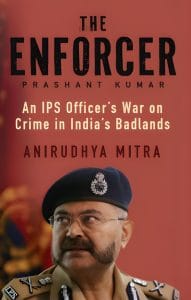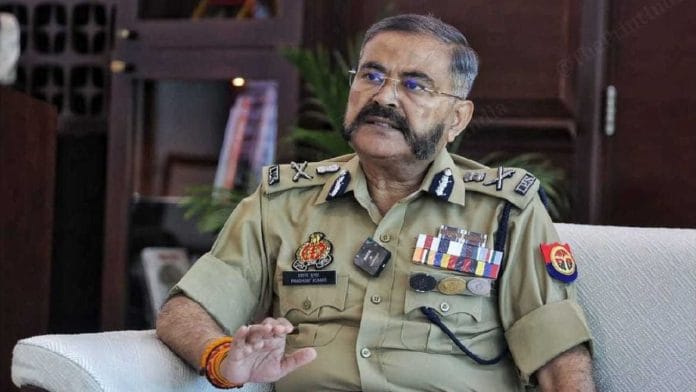One morning, a distinguished filmmaker – someone I had known both as a colleague and a friend – called me out of the blue. His voice carried that unmistakable tone of intrigue, the kind that tells you something interesting is coming. ‘Would you like to write a biography?’ he asked.
My instinctive response: ‘Whose?’
‘An IPS officer. Prashant Kumar.’
I took a beat. ‘Prashant Kumar, you mean…?’
Across the line, he clarified, ‘He is in the UP Police. That big moustache.’
And just like that, the image clicked in my mind. ‘Oh, you mean the top cop of UP? Yeah, of course, I know him … I mean, I keep seeing him on television.’
Every time there was an encounter in UP, there he was – Prashant Kumar, the moustachioed Indian Police Service (IPS) officer, staring unflinchingly at the news anchor, his sharp eyes unwavering as he laid out his version of events. He had a presence, an aura that made you believe that if anyone could take on the kind of criminals who had long ruled the state, it was him. You don’t just need tactics to dismantle organized crime, you also need an attitude, a presence that makes men who believe themselves untouchable realize they are not.
I had seen him dominate television screens, his unwavering gaze locking horns with news anchors, his voice carrying the weight of law and order. He had an aura that made even the most hardened criminals rethink their bravado.
So, when I was asked to write his biography, there was only one answer. Yes. But nothing had prepared me for the man I was about to meet. The tiger in the room, the officer who seemed larger than life, turned out to be something else entirely.
Also read: When CCD founder VG Siddhartha went missing
It was mid-October. I had arrived early at his office. He landed sharp on time. No uniform, no insignia of rank or power. Instead, he walked in wearing steel-grey trousers and a crisp white half-sleeved bush shirt. The man who had loomed large on television screens, the no-nonsense cop with a stare that could unsettle the most seasoned criminals, now stood before me with a warm, almost disarming smile.
‘How are you, sir?’ he said, his voice polite, his demeanour humble. He extended his hand for a firm but welcoming handshake.
It threw me off, if I am being honest. In all my years as a crime reporter, having met and written about some of the most powerful and formidable police officers, I had never encountered one of his rank and stature who greeted me with such genuine warmth. The contrast between the man I had imagined and the one standing in front of me was striking.
I hesitated for a moment, waiting for him to take his seat first. But he gestured towards the chair opposite him and said, ‘Pehle aap.’ You first.
That’s when it hit me – I was in Lucknow. And here was Prashant Kumar – tough-as-nails, feared by gangsters, the man leading the charge in one of the most brutal crackdowns in UP’s history – embodying that very essence of old-world politeness. In that moment, I realized something. However much I thought I knew about him, this was going to be a story full of surprises.
Power in UP comes wrapped in symbols – grand residences, armed security, offices buzzing with political and administrative clout. The DGP house in Lucknow is one such fortress, sprawling across 7 acres and boasting expansive rooms, guest houses, staff quarters, courts for badminton and tennis and massive gardens. It is a residence every senior officer dreams of.
But Prashant Kumar doesn’t live there. He chose a different path. He stays in a house he built himself, on land he bought with his own money. His father had once told him a man should build his own home, not live in something borrowed, no matter how grand. I asked him why he didn’t move into the DGP house like every other officer would.
‘Aadat bigad jaati hai,’ he said simply.
W One day, while I was on my computer writing, a WhatsApp message popped up from Prashant Kumar. It contained an African proverb: ‘Until the lion learns to write, every story will glorify the hunter.’
I told him it was an interesting proverb, no doubt, but what could be the context? Knowing Prashant Kumar, he had no time to waste with me. Then he clarified. He was curious: Why had I agreed to write his story when the media rarely shows interest in going deep into a cop’s side of the story?
It struck a chord with me. This wasn’t just a casual remark, it was also an insight into the mind of Prashant, a man who had spent his life on the frontlines of crime and law enforcement, watching how narratives were shaped, reshaped and sometimes hijacked.
 This excerpt from ‘The Enforcer’ by Anirudhya Mitra has been published with permission from Juggernaut Books.
This excerpt from ‘The Enforcer’ by Anirudhya Mitra has been published with permission from Juggernaut Books.






